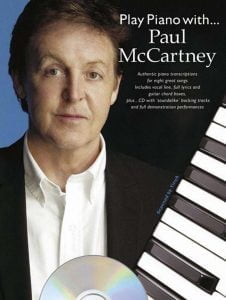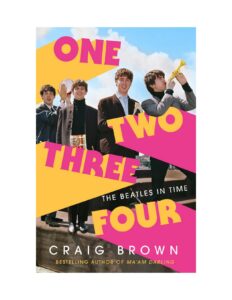Browse in the Library:
Or browse in the categories menus & download the Library Catalog PDF:
Play Piano with Paul McCartney

Play Piano with Paul McCartney Nineteen Hundred And Eighty-Five (Full) with sheet music
Play Piano with Paul McCartney Nineteen Hundred And Eighty-Five (Background) with sheet music
Paul McCartney
The performer and composer Paul McCartney was born in the English city of Liverpool on June 18, 1942 (he will turn 80 years old today).
From an early age, his father instilled in him a love of music. Initially, Paul McCartney started out playing the trumpet, but later he switched to acoustic guitar. At first, McCartney found it difficult to play with his left hand (because he is left-handed), but motivated by seeing that the musician Slim Whitman was also left-handed, he persisted in his attempt. Once he had already mastered the technique of the guitar, he writes his first song: ‘I Lost My Little Girl’.
At 11, he met George Harrison at the Liverpool Institute and at 15 John Lennon. Together with Lennon, they begin to compose songs and form a group. Shortly after, he convinces Lennon to integrate Harrison into the band, and he enters as lead guitar. At the same time, a bassist friend of John’s called Stuart Sutcliffe joined, and thus they formed the band ‘Quarrymen’, which would later be called ‘The Silver Beetles’. It is not until May 1960 when they adopt the famous name of The Beatles.
Soon they team up with producer Allan Williams, who takes them to play at the “Indra” bar in Hamburg, Germany. A short time later, they play in the “Top Ten Club’, and in the “Cavern” Club. Until then, they only played versions of well-known songs by other artists. For this reason, Paul McCartney proposes to Lennon to present his original songs. This is how they record the song ‘My Bonnie’ with Tony Sheridan.
By then, Sutcliffe left the group and The Beatles formed a new lineup: Lennon, Harrison, Starr and McCartney.
In 1962, they signed with the record company ‘Parlophone Records’, after being denied by several others. At the end of that same year, the single ‘Love Me Do’ was born, where McCartney is heard singing a solo in the choirs.
In 1963 the album ‘Please Please Me’ appears, written entirely by the duo McCartney – Lennon. This act of composing would be repeated throughout the Beatles’ discography.
A short time later he meets Linda McCartney (at “The Bag O’Nails” bar), whom he would marry soon after.
In 1966, The Beatles stop doing live performances. At first Paul did not agree very much, but he ended up giving in to the group’s opinion. By his account, McCartney continues to dedicate himself to music, and is the first of the members to launch a solo project. This is how he composed the soundtrack for the movie “The Family Way” in 1966. This material was later released on a disc titled in the same way, and managed to win the “Ivor Novello Award” for “Best Instrumental Theme”.

That same year, McCartney wrote songs and produced albums for other artists such as Mary Hopkin, Badfinger, and the Bonzo Dog Band.
In April 1970, Paul McCartney publicly announced the definitive separation from the Beatles and a week after his success, he released his first solo album, entitled ‘McCartney’.
His second production appeared in 1971 and was entitled ‘Ram’. In August of that same year, he created a new group called ‘Wings’, together with guitarist Denny Laine and drummer Denny Seiwell.
In 1972, Paul recorded the song ‘Live and Let Die’ for the James Bond movie.
Together with the band Wings they released a series of albums such as ‘Wild Life’ (1972), ‘Red Rose Speedway’ (1973) and ‘Band on the Run’ (1974), with which they won two Grammy Awards. During 1975 and 1976, McCartney together with his band made a world tour, which was later collected on an album entitled ‘Wings Over America’.
In 1979, Paul McCartney organizes the relief festival for the people of Cambodia entitled ‘Concerts for the People of Kampuchea’. Also that same year, McCartney’s song ‘Rockestra’ wins a Grammy Award and in December he releases the Christmas single ‘Wonderful Christmas time’.
Paul McCartney kicks off the 1980s with an album titled ‘McCartney II.’ In 1981, following the murder of John Lennon, Paul, along with George Harrison and Ringo Starr released a tribute album entitled ‘All Those Years Ago’.
In 1982, he presents the album ‘Tug of War’, where he sings a duet with Stevie Wonder for the song ‘Ebony and Ivory’. Also on this album appears the tribute song to Lennon, ‘Here Today’. A short time later, two songs recorded with Michael Jackson appear: on the one hand ‘The Girl Is Mine’, which appears on Jackson’s Thriller album, and on the other ‘Say Say Say’, which appears on the album ‘Pipes of Peace’ (1983) by Paul McCartney.
In 1984, McCartney writes and stars in the film ‘Give My Regards to Broad Street.’ Two years later he released the album “Press to Play” and in 1987, the compilation album “All the Best!” appeared, which became a worldwide bestseller.
In 1988, he reunited with Ringo Starr and George Harrison to sing the song ‘When We Was Fab’, which appears on the album “Снова в СССР”. A year later, the album “Flowers in the Dirt” is released. Around that time, McCartney began a collaborative musical relationship with Elvis Costello. Songs like ‘Veronica’ or ‘My Brave Face’ are some of his compositions together.
During the 1990s, Paul released a series of albums such as the live album “Tripping the Live Fantastic” (1990); the live acoustic album “Unplugged (The Official Bootleg)” (1991); the classic McCartney & Carl Davis album “Paul McCartney’s Liverpool Oratorio” (1991); ‘Off the Ground’ (1993); the live album “Paul is Live” (1993); ‘Flaming Pie’ (1997); “Paul McCartney’s Standing Stone” (1997); ‘Run Devil Run’ (1999); and the classic album “Paul McCartney’s Working Classical” (1999).
In 1998, Queen Elizabeth II of England gave him the noble title of ‘Knight’ (Sir).
Paul McCartney begins the new millennium with productions such as the LP of remixes “Liverpool Sound Collage” (2000); ‘Driving Rain’ (2001); the live album “Back in the U.S.” (2002), another live album “Back in the World” (2003); the studio-recorded album “Chaos and Creation in the Backyard” (2005) and the classic album “Ecce Cor Meum” (2006).
In 1995, the Prince of Wales honored him with the recognition of ‘Royal Colleague of Music’.
Best Sheet Music download from our Library.
Browse in the Library:
Or browse in the categories menus & download the Library Catalog PDF:
